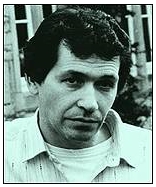John Palmer (criminal)
| John Palmer | |
|---|---|
 |
|
| Born |
John Edward Palmer September 1950 Solihull, Warwickshire, England |
| Died | 24 June 2015 (aged 64) Brentwood, Essex, England |
| Other names | Goldfinger |
| Occupation | Timeshare/mortgage fraudster, gold dealer |
John Edward Palmer (September 1950 – 24 June 2015) was an English gangster and former market trader and gold dealer, involved in various criminal activities including mortgage and timeshare fraud.
The police believed that much of his alleged £300 million fortune was the result of swindles, violence, racketeering and money laundering. Palmer owned a complex network of 122 companies, many offshore in the Isle of Man, Madeira and the British Virgin Islands, as well as 60 offshore bank accounts.
Palmer was born in Solihull, Warwickshire, one of seven children. Reportedly dyslexic, Palmer left school at 15 and joined his brother Malcolm in a roof tiling business and also sold paraffin from "the back of a lorry". He married Marnie J. A. Ryan in 1975 in Bristol.
He ran a gold and jewellery dealing company, Scadlynn Ltd, in Bedminster, Bristol with business partners Garth Victor Chappell and Terence Edward James Patch. Palmer and Chappell had been arrested in 1980 when they worked together selling furniture. The two men were charged with obtaining credit on furniture by providing false references, with Palmer receiving a six month suspended prison sentence.
In 1985, following the November 1983 Brink's-Mat robbery, Chappell and Patch of Scadlynn Ltd were arrested for their involvement in melting down £26 million worth of gold from the robbery to try and pass it off as legitimate. Two days after armed robbers Brian Robinson and Micky McAvoy were jailed, Chappell withdrew £348,000 from the company's accounts. Throughout their trial, a total of £1.1m had been withdrawn.
During the raids, one of the suspects refused to confirm what they had been melting that morning. It was revealed that the company had been processing millions of pounds worth of gold, but claimed it was gold they had purchased themselves. The companies books stated that they were selling the melted gold for virtually the same amount as they had purchased it for - which didn't make sense, unless the records were false. Confiscated documents also showed that the company had been evading tax, and were ordered for pay £80,000 in unpaid tax.
...
Wikipedia
